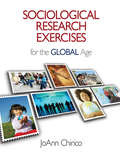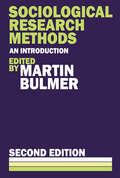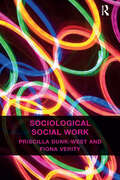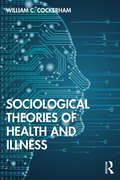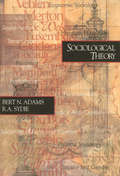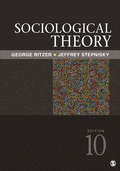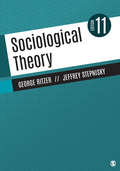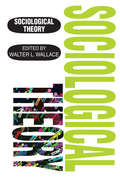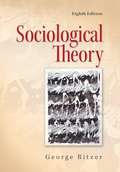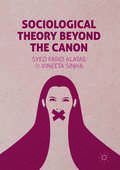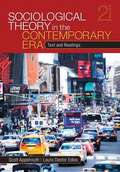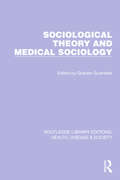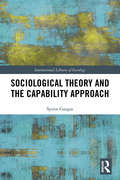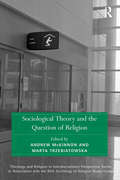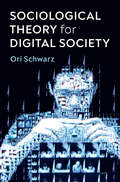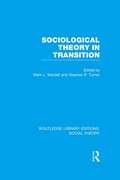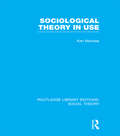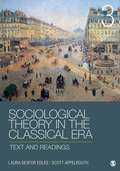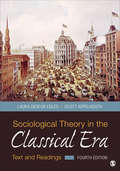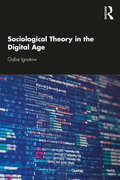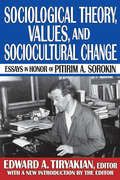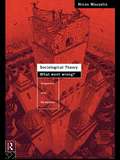- Table View
- List View
Sociological Research Exercises for the Global Age
by Joann A. ChiricoWithin the pages of this manual, students become personally involved in research as they learn important analytical, critical thinking, and communication skills, and develop the ability to interpret the contemporary global situation and its impact on their lives. Linking fundamental concepts of sociology with everyday activities, the exercises in each chapter lead students through an array of qualitative and quantitative methods as they test and apply theories. Students experience research as a process of asking questions, defining terms clearly, seeking patterns, and reaching conclusions based on their findings, while avoiding bias.Short essays describing current perspectives on globalization accompany the exercises, addressing political, cultural, social, economic, technological, and religious dimensions. Key Features25 research exercises may be completed by students in class or independently, providing flexibility for the instructor. Exercises are ready to be assigned as they appear in the text, with convenient tear-out pages.Students investigate intriguing topics such as "Global Ethics," "Violating Folkways," "Bowling Alone," and "McDonald's Versus Jihad."A variety of research methods are featured: interviews, experiments, functional analysis, content analysis, and more.Extensive follow-up "Discussion" sections help students maximize their understanding.Surveys and qualitative exercises adapted from larger studies allow students to compare their results with national and global patterns of results, which they may explore further through the Web links provided.Intended Audience: This interactive manual follows the format of standard introductory sociology texts, making it an engaging and easy fit for Introductory Sociology or Principles of Sociology courses.
Sociological Research Methods: An Introduction
by Martin BulmerA rich source of ideas about sociological research methods to assist the researcher in determining what method will provide the most reliable and useful knowledge, how to choose between different methodologies, and what constitutes the most fruitful relationship between sociological theories and research methods.
Sociological Social Work
by Priscilla Dunk-West Fiona VeritySociological social work is a lifelong social work practice which is animated by a sociological perspective. Social workers 'shorthand' orientations such as 'strengths perspective', 'task centred' or 'humanistic' (to name but a few), as a way to identify their philosophical and theoretical approaches in professional life. Whilst some texts have examined sociology for social work, this text instead proposes that sociological social work is a legitimate and theoretically rich orientation, and this book demonstrates what sociological social work looks like in our rapidly changing world. This text will equip students and practitioners with a way to think sociologically, not just while they are studying, but as an ever present reference for making sense of social work purpose and how this is realised in a transforming world. This follows an established tradition in social work literature, but this book elevates and names the importance of this approach, which we argue is critically needed if social work is to achieve its agenda in transformative social, political economic and environmental contexts. The current landscape in which we live is one that is characterised by rapid changes which have implications for the life experiences of those with whom social workers work, social justice advocacy agendas, and for fulfilling the purpose of social work more generally. This book is essential reading for those looking to keep up with these changes.
Sociological Theories of Health and Illness
by William C CockerhamSociological Theories of Health and Illness reviews the evolution of theory in medical sociology beginning with the field’s origins in medicine and extending to its present-day standing as a major sociological subdiscipline. Sociological theory has an especially important role in the practice of medical sociology because its theories distinguish the subdiscipline from virtually all other scientific fields engaged in the study of health and illness. The focus is on contemporary theory because it applies to contemporary conditions; however, since theory in sociology is often grounded in historical precedents and classical foundations, this material is likewise included as it relates to medical sociology today. This book focuses on the most commonly used sociological theories in the study of health and illness, illustrating their utility in current examples of empirical research on a wide range of topics. The qualitative or quantitative research methods applicable to specific theories are also covered. Distinctions between macro and micro-level levels of analysis and the relevance of the agency-structure dichotomy inherent in all theories in sociology are discussed. Beginning with classical theory (Durkheim, Weber, and Marx) and the neglected founders (Gilman, Martineau, and DuBois), along with symbolic interaction (Mead, Strauss) and labeling theory (Becker), and poststructuralism and postmodernism (Foucault), coverage is extended to contemporary medical sociology. Discussion of the stress process model (Pearlin) is followed by the social construction of gender and race and intersectionality theory (Collins), health lifestyle theory (Cockerham), life course theory (Elder), fundamental cause theory (Link and Phelan), and theories of the medical profession (Freidson), medicalization and biomedicalization (Conrad, Clarke), and social capital (Bourdieu, Putnam, and Lin).
Sociological Theory
by Dr Bert N. Adams Professor R. A. SydieThis concise text, covers both classical and contemporary social thought. It traces the major schools of thought over the past 150 years as they appear and reappear in different chapters and looks at important new voices in social theory. The treatment of individual theories and theorists is balanced with the development of key themes and ideas about social life.
Sociological Theory
by Dr George Ritzer Mr Jeffrey N. StepniskyNow with SAGE Publishing, and co-authored by one of the foremost authorities on sociological theory, the Tenth Edition of Sociological Theory by George Ritzer and Jeffrey Stepnisky gives readers a comprehensive overview of the major theorists and schools of sociological thought, from sociology's origins through the early 21st century. Key theories are integrated with biographical sketches of theorists, and are placed in their historical and intellectual context. This text helps students better understand the original works of classical and modern theorists, and enables them to compare and contrast the latest substantive concepts. New to this Edition Chapter 1 now includes a discussion of colonialism as one of the forces that shaped modern society. The “Historical Sketch” chapters contain new material on the historical significance of early women founders, and on the contributions of W.E.B. Du Bois. Chapters on Marx, Durkheim, Weber, and Simmel now conclude with sections on contemporary applications of ideas from these 19th century thinkers. A new chapter focuses theories of race, racism, and colonialism, as well as theories about indigenous peoples and theories from the “Global South” that challenge the work of scholars from Europe and North America. The concluding chapter has a new section on theories of prosumption, one of the newest developments in consumer theory. New material on colonization, women classical theorists, and race theory, as well as new timelines, added to history chapters.
Sociological Theory
by George Ritzer Jeffrey N. StepniskyThe authors are proud sponsors of the SAGE Keith Roberts Teaching Innovations Award—enabling graduate students and early career faculty to attend the annual ASA pre-conference teaching and learning workshop. Sociological Theory gives readers a comprehensive overview of the major theorists and schools of sociological thought, from sociology′s 19th century origins through the early 21st century. Written by an author team that includes one of the leading contemporary thinkers, the text integrates key theories with biographical sketches of theorists, placing them in historical and intellectual context. The Eleventh Edition includes examples of premodern sociological theory from Islamic scholar Ibn Khaldun, Harriet Martineau’s feminist writings contextualized within the history of sociological thought, discussions of actor-network theory through Donna Haraway’s work on cyborgs and companion species, illustrations of historical comparative sociology with Saskia Sassen’s concepts of the global city and expulsions, and more ways to help students to understand sociology’s major theories. Included with this title: The password-protected Instructor Resource Site (formally known as SAGE Edge) offers access to all text-specific resources, including a test bank and editable, chapter-specific PowerPoint® slides. Learn more.
Sociological Theory
by George Ritzer Jeffrey N. StepniskyThe authors are proud sponsors of the SAGE Keith Roberts Teaching Innovations Award—enabling graduate students and early career faculty to attend the annual ASA pre-conference teaching and learning workshop. Sociological Theory gives readers a comprehensive overview of the major theorists and schools of sociological thought, from sociology′s 19th century origins through the early 21st century. Written by an author team that includes one of the leading contemporary thinkers, the text integrates key theories with biographical sketches of theorists, placing them in historical and intellectual context. The Eleventh Edition includes examples of premodern sociological theory from Islamic scholar Ibn Khaldun, Harriet Martineau’s feminist writings contextualized within the history of sociological thought, discussions of actor-network theory through Donna Haraway’s work on cyborgs and companion species, illustrations of historical comparative sociology with Saskia Sassen’s concepts of the global city and expulsions, and more ways to help students to understand sociology’s major theories. Included with this title: The password-protected Instructor Resource Site (formally known as SAGE Edge) offers access to all text-specific resources, including a test bank and editable, chapter-specific PowerPoint® slides. Learn more.
Sociological Theory
by Walter WallaceIn this fundamental contribution to the study and application of sociological theory, Wallace examines a wide range of theories within a framework that clarifies their interrelationships and illustrates their implications for empirical research. Wallace is able to point out the symbiotic relationships among these theories which, at first, may appear to be in direct opposition--or at least discord.Sociological Theory begins with an original essay by the editor that introduces the reader to eleven general theoretical viewpoints. He calls these ecologism, demographism, materialism, psychologism, technologism, functional structuralism, exchange structuralism, conflict structuralism, symbolic interactionism, social actionism, and functional imperativism. To do this, Wallace assembles selected readings by major theorists that provide detailed examples of each of the theoretical viewpoints discussed. The selections are keyed to the framework developed in the Introduction, so as to enable the reader to work back and forth between the general and the particular statements. Offering far more than a mere survey or an abstract critical analysis, In this way, Sociological Theory provides a learning matrix that facilitates comprehension and enables the reader systematically to expand his knowledge of sociological theory.In developing his analytical framework, Wallace points out how these different types of theory complement rather than conflict with one another. Through this approach, he is able to show the distinctive level and scope of analysis of each theory to demonstrate why the sociologist must draw upon and integrate several viewpoints for interpreting research results and formulating hypotheses. A useful guide and reference work for researchers and teachers, the book is an excellent basic or supplementary text for all theory courses. As Robert K. Merton noted at the time of the original publication, "Sociological Theory is a bea
Sociological Theory (8th Edition)
by George RitzerThis text gives readers a comprehensive overview of the major theorists and schools of sociological thought. The integration of key theories with biographical sketches of theorists and the requisite historical and intellectual context helps students to better understand the original works of classical and modern theorists as well as to compare and contrast the latest substantive theories.
Sociological Theory Beyond the Canon
by Vineeta Sinha Syed Farid AlatasThis book expands the sociological canon by introducing non-Western and female voices, and subjects the existing canon itself to critique. Including chapters on both the 'founding fathers' of sociology and neglected thinkers it highlights the biases of Eurocentrism and androcentrism, while also offering much-needed correctives to them. The authors challenge a dominant account of the development of sociological theory which would have us believe that it was only Western European and later North American white males in the nineteenth and early twentieth century who thought in a creative and systematic manner about the origins and nature of the emerging modernity of their time. This integrated and contextualised account seeks to restructure the ways in which we theorise the emergence of the classical sociological canon. This book's global scope fills a significant lacuna and provides a unique teaching resource to students of classical sociological theory.
Sociological Theory In The Contemporary Era: Text And Readings
by Scott Appelrouth Laura EdlesSociological Theory in the Contemporary Era, Second Edition, combines well-edited, important original writings from sociology′s core contemporary theorists with introductory text that provides a historical and theoretical framework for understanding them. Authors Scott Appelrouth and Laura Desfor Edles use this unique text/reader approach to introduce students to contemporary sociological theory in a lively and engaging fashion. The text/reader provides not only a biographical and theoretical summary of each theorist′s works but also an overarching scaffolding that students can use to examine, compare, and contrast each theorist′s major themes and concepts. The book also offers discussions of past social and intellectual milieus to provide a holistic picture of the development of the theories discussed.
Sociological Theory and Medical Sociology (Routledge Library Editions: Health, Disease and Society #22)
by Graham ScamblerOriginally published in 1987, this book builds bridges between medical sociology and mainstream theory. It does so by demonstrating in new and important ways how selected theories of major thinkers like Marx, Durkheim, Weber, Freud, Parsons, Goffman, Foucault, Habermas and Offe stand to inform, and in turn be informed by the often highly focused and empirical studies of health, disease and health care found in contemporary medical sociology. The topics covered include doctor-patient interaction and the formation of health policy.
Sociological Theory and the Capability Approach (International Library of Sociology)
by Spiros GangasSociological Theory and the Capability Approach connects normative strands of sociological theory to the fusion of ethics and economics proposed by Amartya Sen’s and Martha Nussbaum’s capability approach. Spanning classical (Hegel, Marx, Durkheim, Scheler, Weber) and contemporary debates (Parsons, Giddens, Luhmann) it identifies areas that bridge the current gap between sociology and capability approach. It thus builds on explanatory and normative concerns shared by both traditions. Engaging readers from sociology and capability approach, Spiros Gangas suggests that the proposed dialogue should be layered along the main areas of value theory, economy and society, extending this inquiry into the normative meaning attached to being human. To this end, the book reconstructs the notion of agency along the tracks of Nussbaum’s central human capabilities, considering also alienation and the sociology of emotions. It concludes by addressing the capability approach through the lens of social institutions before it takes up the challenge of ideological fundamentalism and how it can be effectively confronted by capability approach. This original book provides a fresh perspective on capability approach as it embeds it in the rich pool of sociological theory’s accomplishments. As an exercise in theoretical and normative convergence, it will be required reading for academics and students in social theory, cultural theory, philosophy and human development studies.
Sociological Theory and the Question of Religion (Theology and Religion in Interdisciplinary Perspective Series in Association with the BSA Sociology of Religion Study Group)
by Andrew McKinnon Marta TrzebiatowskaReligion lies near the heart of the classical sociological tradition, yet it no longer occupies the same place within the contemporary sociological enterprise. This relative absence has left sociology under-prepared for thinking about religion’s continuing importance in new issues, movements, and events in the twenty-first century. This book seeks to address this lacunae by offering a variety of theoretical perspectives on the study of religion that bridge the gap between mainstream concerns of sociologists and the sociology of religion. Following an assessment of the current state of the field, the authors develop an emerging critical perspective within the sociology of religion with particular focus on the importance of historical background. Re-assessing the themes of aesthetics, listening and different degrees of spiritual self-discipline, the authors draw on ethnographic studies of religious involvement in Norway and the UK. They highlight the importance of power in the sociology of religion with help from Pierre Bourdieu, Marx and Critical Discourse Analysis. This book points to emerging currents in the field and offers a productive and lively way forward, not just for sociological theory of religion, but for the sociology of religion more generally.
Sociological Theory for Digital Society: The Codes that Bind Us Together
by Ori SchwarzThe digital revolution has not only transformed multiple aspects of social life – it also shakes sociological theory, transforming the most basic assumptions that have underlain it. In this timely book, Ori Schwarz explores the main challenges digitalization poses to different strands of sociological theory and offers paths to adapt them to new social realities. What would symbolic interactionism look like in a world where interaction no longer takes place within bounded situations and is constantly documented as durable digital objects? How should we understand new digitally mediated forms of human association that bind our actions and lives together but have little in common with old-time 'collectives'; and why are they not simply ‘social networks’? How does social capital transform when it is materialized in a digital form, and how does it remould power structures? What happens to our conceptualization of power when faced with the emergence of new forms of algorithmic power? And what happens when labour departs from work? By posing and answering such fascinating questions, and offering critical tools for both students and scholars of social theory and digital society to engage with them, this thought-provoking book draws the outline of future sociological theory for our digital society.
Sociological Theory in Transition (Routledge Library Editions: Social Theory)
by Stephen P. Turner Mark L. WardellCurrent sociological theories appear to have lost their general persuasiveness in part because, unlike the theories of the ‘classical era’, they fail to maintain an integrated stance toward society, and the practical role that sociology plays in society. The authors explore various facets of this failure and possibilities for reconstructing sociological theories as integrated wholes capable of conveying a moral and political immediacy. They discuss the evolution of several concepts (for example, the social, structure, and self) and address the significant disputes (for example, structuralism versus humanism, and individual versus society) that have dominated twentieth-century sociological thought. Their ideas and analyses are directed towards an audience of students and theorists who are coming to terms with the project of sociological theory, and its relationship with moral discourses and political practice. The authors of these essays are sociological theorists from the United States, the United Kingdom and Canada. They are all established, but not ‘establishment’ authors. The book contains no orthodoxies, and no answers. However, the essays do contribute to identifying the range of issues that will constitute the agenda for the next generation of sociological theorists.
Sociological Theory in Use (Routledge Library Editions: Social Theory)
by Kenneth MenziesCentral to most sociologists’ self-image is the claim that their theories are based on research. However, using a random sample of 680 articles appearing in major American, British and Canadian journals, Dr Menzies shows that in some areas of sociology the wide gap between theory and research means that much of sociological theory is virtually untested. He explains how theory is embodied in eight particular types of research, critically examines these research theories, and contrasts them with the positions of modern theorists. The sample of journal articles also permits a comparison of British, American and Canadian sociology. By contrasting on how researchers us theories, Dr Menzies is able to reassess several theories. For instance, symbolic interactionist research uses embedded causal claims and stands in a dialectical relationship to other sociological research, while the research version of conflict theory depends on external causes to explain social change. The implications of using statistical techniques like factor analysis and regression are also considered in relation to the form of explanation.
Sociological Theory in the Classical Era 3rd Edition
by Laura Desfor Edles Scott AppelrouthSociological Theory in the Classical Era introduces students to original major writings from sociology's key classical theorists. It also provides a thorough framework for understanding these challenging readings. For each theorist, the authors give a biographical sketch, discuss intellectual influences and core ideas, and offer contemporary examples and applications of those ideas. Introductions to every reading provide additional background on their structure and significance.
Sociological Theory in the Classical Era: Text and Readings
by Laura D. Edles Dr. Scott AppelrouthSociological Theory in the Classical Era, Fourth Edition is an innovative text/reader for courses in classical theory. It introduces you to important original works by sociology's key classical theorists while providing a thorough framework for understanding these challenging readings. For each theorist, the editors supply a biographical sketch, discuss intellectual influences and core ideas, and offer contemporary applications of those ideas. In addition to the seven major theorists covered, the book also connects their work to "Significant Others"—writers and thinkers who may have derived much of their own perspectives from Marx, Durkheim, Weber, Gilman, Simmel, Du Bois, and Mead.
Sociological Theory in the Classical Era: Text and Readings
by Laura D. Edles Dr. Scott AppelrouthSociological Theory in the Classical Era, Fourth Edition is an innovative text/reader for courses in classical theory. It introduces you to important original works by sociology's key classical theorists while providing a thorough framework for understanding these challenging readings. For each theorist, the editors supply a biographical sketch, discuss intellectual influences and core ideas, and offer contemporary applications of those ideas. In addition to the seven major theorists covered, the book also connects their work to "Significant Others"—writers and thinkers who may have derived much of their own perspectives from Marx, Durkheim, Weber, Gilman, Simmel, Du Bois, and Mead.
Sociological Theory in the Digital Age
by Gabe IgnatowWhat is the role of sociological theory in the information age? What kinds of theories are best suited to analyzing the social uses of digital technologies, and for using digital technologies in new ways to study the social? This book contributes to several ongoing conversations on how the social sciences can best adapt to contemporary information technologies and information societies. Focusing on practical or ‘usable theory,’ it surveys the challenges and opportunities of conducting social science in the information age, as well as the theoretical solutions that sociologists have developed and applied over the last two decades. With specific attention to three theoretical approaches in digital social research—critical theory, forensic theory and Bourdieusian theory—the author provides an overview of the history and main tenets of each, surveys its use in sociological research, and evaluates its successes and limitations. Taking a long-term view of theoretical development in evaluating schools of thought and considering their productivity in analyzing and using contemporary digital communication technologies, this book thus treats theory as a tool for empirical research and the development of theory as inseparable from research practice. As such, it will appeal to scholars of sociology and social theory with interests in research methods, the development of theory and digital technologies.
Sociological Theory, Values, and Sociocultural Change: Essays in Honor of Pitirim A. Sorokin
by Harriet MartineauThis volume brings together some of the biggest names in the field of sociology to celebrate the work of Pitirim A. Sorokin, professor and founder of the department of sociology at Harvard University. Sorokin, a past president of the American Sociological Association, was a pioneer in many fields of research, including sociological theory, social philosophy, methodology, and sociology of science, law, art, and knowledge. Edward A. Tiryakian's updated introduction examines major factors, inside and outside sociology, that have led to new appreciation of Sorokin's contributions and scholarship, and demonstrates their continued relevance. This new edition also includes an updated bibliography of works by and about Sorokin.The volume includes Arthur K. Davis, who describes Sorokin's importance as a teacher in the Socratic tradition. Talcott Parsons examines internal differentiation in Christianity in its historical Western development. Thomas O'Dea deals with the institutionalization of religious values. Walter Firey examines how actors relate their conception of a distant future to their present behavior. Florence Kluckhohn focuses upon the problem of cultural variations within a social system. Robert K. Merton and Elinor Barber examine the sociological aspect of ambivalence. Bernard Barber considers the American business's efforts to institutionalize professionalism.Other contributors include Charles P. Loomis, Wilbert E. Moore, Georges Gurvitch, Marion J. Levy, Jr., Nicholas S. Timasheff, Carle Zimmerman, and Logan Wilson. This volume is an essential collection of essays concerning the work of one of the most prominent thinkers in twentieth-century sociology.
Sociological Theory: Classical Statements
by Dr George Ritzer Mr Jeffrey N. StepniskyNow with SAGE Publishing, and co-authored by one of the foremost authorities on sociological theory, the Tenth Edition of Sociological Theory by George Ritzer and Jeffrey Stepnisky gives readers a comprehensive overview of the major theorists and schools of sociological thought, from sociology's origins through the early 21st century. Key theories are integrated with biographical sketches of theorists, and are placed in their historical and intellectual context. This text helps students better understand the original works of classical and modern theorists, and enables them to compare and contrast the latest substantive concepts. New to this Edition Chapter 1 now includes a discussion of colonialism as one of the forces that shaped modern society. The “Historical Sketch” chapters contain new material on the historical significance of early women founders, and on the contributions of W.E.B. Du Bois. Chapters on Marx, Durkheim, Weber, and Simmel now conclude with sections on contemporary applications of ideas from these 19th century thinkers. A new chapter focuses theories of race, racism, and colonialism, as well as theories about indigenous peoples and theories from the “Global South” that challenge the work of scholars from Europe and North America. The concluding chapter has a new section on theories of prosumption, one of the newest developments in consumer theory. New material on colonization, women classical theorists, and race theory, as well as new timelines, added to history chapters.
Sociological Theory: Diagnosis and Remedies
by Nicos MouzelisSocial theory is open to many passing currents. Claims to originality tend to thrive and past achievements are often ignored. In Sociologiocal Theory: What Went Wrong? Mouzelis claims that "problems" currently being isolated are not really problems, and that "achievements" claimed are little more than pretensions. He argues that we have been premature to dismiss thinkers from the late 1950s and early 1960s and that we can build on their ideas to produce a more effective, more relevant social theory. Written with precision and with clarity, Sociological Theory: What Went Wrong? is a compelling analysis of the central problems of sociological theory today and of the means to resolve them.
